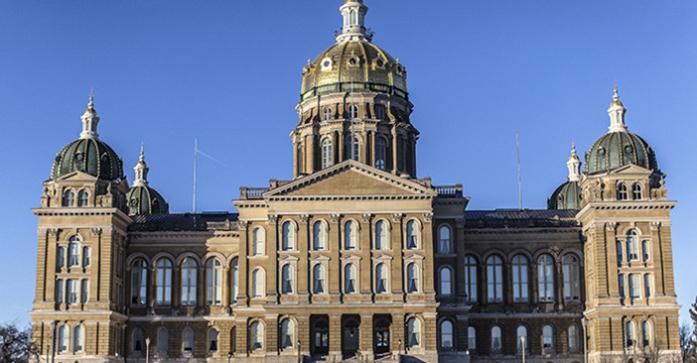College betting sticking point in Iowa sports-gambling proposals
Gambling on college sports could become a regulated industry in Iowa after this legislative session. In order to gain enough support to pass, though, limitations on college betting may be on the horizon.
March 6, 2019
Sports fans in Iowa may be able to bet on college and professional sports after this legislative session.
Two proposals to legalize and regulate gambling on athletics in Iowa will stay alive past the session’s March 8 funnel deadline, but the eventual success of the bills could hinge on a few disputed changes to college sports wagering.
Before the House version passed the House State Government Committee on Feb. 28, House Democrats submitted three amendments that didn’t make it on the bill. In both bills’ current form, sports betting on both college and pro sports would be operated by Iowa’s approximately 20 casinos, and regulation would be undertaken by the Iowa Racing and Gaming Commission. The proposed tax rate in the House version is 6.75 percent; the Senate bill doesn’t yet include a tax.
Rep. Vicki Lensing, D-Iowa City, said she plans to resubmit an amendment to exclude betting on college sports once the bill goes to the House floor. A separate amendment, which she said will likely also be reintroduced, would ban during-the-game betting on individual players — one example would be a bet on a player missing her or his third free throw of the game.
RELATED: Sports betting makes way into college football and Big Ten media days
“Those are sometimes minors, they are young people. Amateurs. College students,” said Lensing, who represents part of Iowa City and the University of Iowa campus. “There’s enough temptation around. I don’t think betting needs to put pressure on them to perform a certain way.”
Rep. Bobby Kaufmann, R-Wilton, a key Republican who is pushing to pass sports-betting legislation this session, said he shared House Democrats’ concerns with college players being offered money to play a certain way, but he said he would rather leave regulation to the gaming commission.
“Black-market betting is going on at a very large scale right now, and I think if you prohibit any particular bet from being considered, those people are just going to stay doing it in the black market,” Kaufmann said.
With Republicans making up the majority in the Iowa House (54 Republicans to 46 Democrats) and the Iowa Senate (32-17), legislation can pass the chamber with a simple majority if all Republicans, but no Democrats, support it.
But the sports-gambling proposal needs support from lawmakers in both parties in order to make it to the governor’s desk, Kaufmann said.
“Gambling bills are unique in that they are not traditionally partisan,” Kaufmann said. “There’s going to be hard-core ‘noes’ from Republicans and Democrats, and there will be ‘yeses’ from both.”
He said the bill’s success will almost certainly depend on getting Democrats on board, which could mean legislators will have to compromise on during-the-game college betting or other amendments.
“I believe that we will have to come to an agreement until several Democrats’ votes will be a yes,” Kaufmann said.
The next step for the two bills, which have both passed out of committee, will be to go through the Ways and Means Committees and then be debated and voted on by both chambers. Kaufmann said he wasn’t concerned about reconciling the House and Senate versions.
“I need to work with my Democratic friends to make sure we can get on the same page for a House vote,” Kaufmann said. “That’s the most important matter to me at this time.”
Since May 2018, when the U.S. Supreme Court overturned a 1992 law that prevented most states from legalizing sports betting, the NCAA and universities have examined potential conflicts that could arise from legalized sports betting.
The UI has begun spearheading education efforts with its student-athletes, Iowa Associate Athletics Director Lyla Clerry said. Part of her job is to inform players not to share information about the team, such as injuries or player situations, to prevent the spread of information that could give someone a betting advantage.
“[Sports wagering] is not completely new to us,” Clerry said. “We’ve been preparing for this, because even if it doesn’t happen here, it happens where students compete.”
Eight states have operational sports-wagering systems, according to the American Gaming Association.
Clerry said she personally is keeping an eye on in-game betting, because it heightens the concern of influencing players’ decisions. The UI hasn’t taken a stance on specific proposals.
“If someone says, ‘Hey, I’ll give you a $1,000 if you miss this shot — that’s not what the sport’s about … it changes the game entirely,” she said.
The state Board of Regents, which governs Iowa’s three public universities, hasn’t yet taken a stance on either of the sports-betting proposals, but regent spokesman Josh Lehman said the regents continue to monitor the language as they move through the legislative process.
Neither bill specifies which Iowa universities or colleges would be authorized to bet on, but Kaufmann said in his research of other states’ operations, the demand for betting on smaller college athletics didn’t exist.
Wartburg Sports Information Director KatieJo Kuhens said that school hadn’t made any preparations for betting on Division 2 colleges.
“You can’t go to Vegas and bet on Wartburg over Dubuque … we’re just not up there,” she said.















